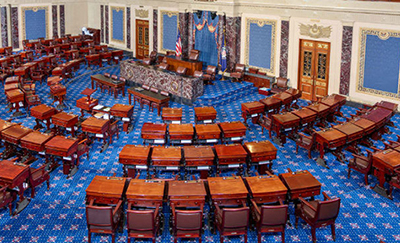
MBA, Coalition Raise Concerns over Proposed Small-Business Tax Increase

The Mortgage Bankers Association and a broad coalition of nearly 200 industry, trade and business groups sent a letter to Capitol Hill this week strongly opposing proposals that would increase taxes on small businesses.
The letter to House and Senate leadership raises alarms about a reported proposal, currently part of Senate negotiations in what would essentially be a slimmed-down version of the stalled Build Back Better Act, that would expand the 3.8 percent Net Investment Income Tax to individuals and families who actively participate in their business, and limit the ability of small, individually and family-owned businesses to fully deduct their losses during an economic downturn by expanding and extending the so-called “excess business loss limitation” for “noncorporate taxpayers.”
Proponents of the proposal argue that it would close a loophole that allows some high earners to slash their tax bills; additionally, they say money raised from the proposal would help pay for Medicare through 2031, preventing that program from going bankrupt by 2028 under government estimates.
However, the Main Street Coalition letter called the proposal an “ill-advised tax policy” being considered at a moment when the economy is no longer growing. And it argued that the proposal would have unintended consequences for millions of Main Street businesses employing tens of millions of American workers.
“In the face of a possible recession, 40-year high inflation, unprecedented supply-chain challenges and chronic labor shortages, raising taxes on small, individually and family-owned businesses is the wrong approach and should be rejected,” the letter said.
The letter noted combined, the proposals would increase revenues by more than $400 billion over 10 years, shouldered entirely on the backs of small, individually, and family-owned businesses.
“Expanding the 3.8 percent NIIT represents nothing more than an 11 percent increase in the rates imposed on family-owned businesses,” the letter said. “Based on Treasury data, we estimate up to 1 million small and family-owned businesses, representing over half of all pass-through business activity, would be at risk of having their rates increased under this policy. This small business tax hike would hurt the ability of businesses that survived the worst global pandemic in a century to remain viable in the coming months.”
The letter also pointed out that the assertion that expanding the NITT would close a tax loophole and increase Medicare funding, neither claim is true, noting NIIT was created as part of the Affordable Care Act and was meant to apply to investment income only. It said NIIT did not fund Medicare when it was adopted in 2010, and attributing the revenues raised by its expansion to Medicare likely violates federal law.
“During the Great Recession, many businesses were able to survive, in part, due to policies that allowed them to offset their current losses against taxes they had previously paid,” the letter said. “These refunds were particularly important for cyclical industries such as construction, manufacturing and travel and tourism. Extending and expanding the “excess loss limitation” rules into the future would prevent pass-through businesses from having this relief in the next recession, increasing the odds that they don’t survive.”
“Raising taxes on small and family-owned businesses with the economy on the brink of a recession, a situation which is compounded by the other post-pandemic challenges they face, harms not only the businesses but the families and communities who rely on them,” the letter added. “We ask you to reject these or any tax hikes on America’s small and family-owned businesses in any legislation considered this year.”
